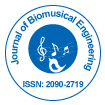Editorial Open Access
Music Pills for Diabetics
Vijay Pratap Singh*
Physiotherapy, Sikkim Manipal Institute of Medical Science, Sikkim Manipal University, 5th Mile, Tadong, Gangtok, India
- Corresponding Author:
- Vijay Pratap Singh
Physiotherapy, Sikkim Manipal Institute of Medical Science
Sikkim Manipal University, 5th mile, Tadong, Gangtok-737101, India
Tel: +918967035789
E-mail: drvijaympt@gmail.com
Received date: October 21, 2015 Accepted date: October 23, 2015 Published date: October 26, 2015
Citation: Singh VP (2015) Music Pills for Diabetics. J Biodivers Endanger Species 3:e109. doi:10.4172/2332-2543.1000e109
Copyright: © 2015 Singh VP. This is an open-access article distributed under the terms of the Creative Commons Attribution License, which permits unrestricted use, distribution, and reproduction in any medium, provided the original author and source are credited.
Related article at Pubmed, Scholar Google
Visit for more related articles at Journal of Biomusical Engineering
Abstract
Diabetes is not just hyperglycemia. Especially Type II DM is a multidimensional and multi-systemic disorder. Anxiety, chronic stress and depression are byproducts of DM. These psychological conditions are associated with premature morbidity and mortality. When anxiety, depression and chronic stress co-exist with diabetes, management of patient becomes difficult and multi-factorial because of risk of developing co-morbidities, complications and associated cost multiplies
Editorial
Diabetes is not just hyperglycemia. Especially Type II DM is a multidimensional and multi-systemic disorder. Anxiety, chronic stress and depression are byproducts of DM. These psychological conditions are associated with premature morbidity and mortality. When anxiety, depression and chronic stress co-exist with diabetes, management of patient becomes difficult and multi-factorial because of risk of developing co-morbidities, complications and associated cost multiplies [1].
Music has been used for centuries to promote relaxation and alleviate anxiety and pain. Music is older than mankind and it has its presence in every religion and divine books. There is special mention of music as a method of healing in Vedas [2]. In modern medicine music has been used as a therapy in 1800s. In 1990, That proposed that music stimuli have biological effects on human behavior by engaging specific brain functions involved in memory, learning, and multiple motivational and emotional states [3]. Music affects right cerebral hemisphere whereas left brain plays as an analyzer by interpretation of musical effects. Music is an auditory perception with its deep effects in brain as it affects central auditory center in temporal lobe which then recruits and signals thalamus, midbrain, pons, amygdale and hypothalamus [4]. Weeks 1991 elucidated that music therapy is a powerful tool especially for treatment of anxiety, pain and depression but its mechanisms are unclear or not well researched. However there is a plethora of research published in last decade which has brought music therapy to evidence based intervention [5].
Music promotes healing and is reflected by a balanced state of mind, body, and spirit. Commonly accepted theory of efficacy of music medicine in pain, anxiety, stress and depression due to any pathological condition either physical or psychological, music acts as a distracter which diverts patients attention to pleasant and encouraging musical stimulus by pushing subjects’ attention away from the trap of negative vicious circle of heightened sympathetic arousal. Definitely, music works through complex psycho-neuro-endocrine mechanisms by positively affecting the brain and thereby inducing relaxation. Music therapy is a powerful non-pharmacologic intervention that has been shown to be effective promoting relaxation and reducing anxiety in patients with cardiopulmonary, metabolic, psychiatric, neurologic and endocrine disorders. This therapy has not been well researched in Type II DM, the demon of 21st century, but published literature do show a promising alternate adjunct therapy to control co-morbid factors in diabetes like anxiety, depression, poor motivation to exercise and therefore achievement of optimal glycemic control.
References
- Wild S, Roglic G, Green A, Sicree R, King H (2004). Global prevalence of diabetes: estimates for the year 2000 and projections for 2030. Diabetes Care 27: 1047-1053.
- Mohan V, Sandeep S, Deepa R, Shah B, Varghese C (2007). Epidemiology of type 2 diabetes: Indian scenario. Indian J Med Res 125: 217-230.
- Collins MM, Corcoran P, Perry IJ (2009). Anxiety and depression symptoms in patients with diabetes. Diabet Med 26: 153-161.
- Fredericks S, Lapum J, Lo J (2012). Anxiety, depression, and self-management: a systematic review. Clin Nurs Res 21: 411-430.
- Hanser SB (2014). Music therapy in cardiac health care: current issues in research. Cardiol Rev 22: 37-42.
Relevant Topics
Recommended Journals
Article Tools
Article Usage
- Total views: 10239
- [From(publication date):
December-2015 - Jul 01, 2025] - Breakdown by view type
- HTML page views : 9261
- PDF downloads : 978
